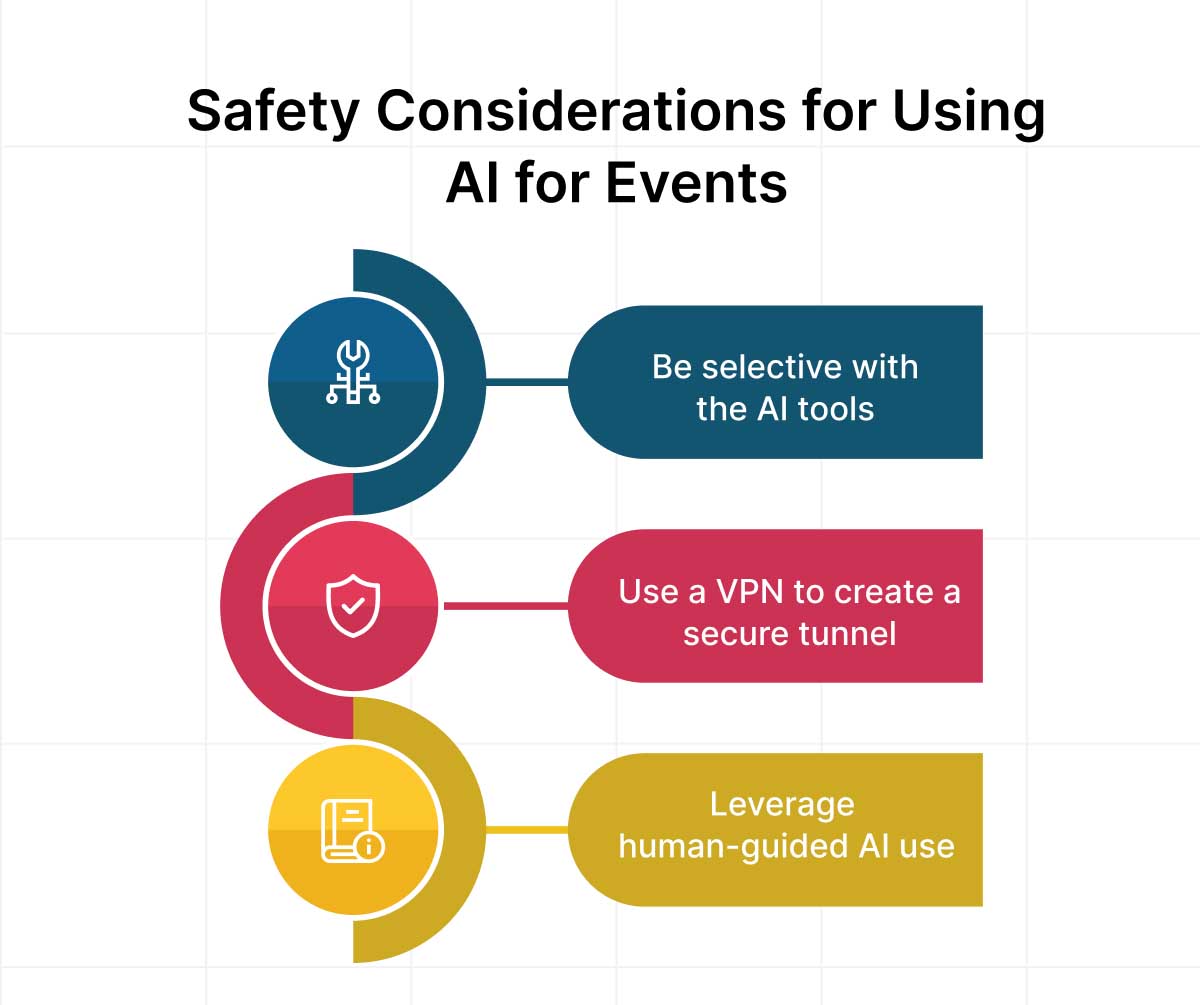7 Effective AI Tools For Event Planning (2025)
- January 16, 2024
- 11 mins read
- Listen

Table of Content
Are you jumbled with a variety of tasks for your next event? Event planning comes with various tasks, like managing guest lists, coordinating schedules, or organizing logistics. Artificial intelligence can streamline the event planning process. The revolution in AI has made a lot of tasks easier than before. And, if you know how to use AI for event planning smartly, you make memorable ones without an extra headache.
Artificial intelligence (AI) has transformed how we plan, organize, and experience online events. It can automate tasks, enhance personalization, and improve engagement. With AI solutions, event organizers can provide a better overall user experience.
This blog aims to guide you through the use and benefits of AI in event planning.
The Rise of AI in Event Planning
AI has recently become the wide reality of our lives. It has paved our way in an enhanced direction, from idea generation to getting ideas alive. According to a report by Eventbrite, 51% of event organizers believe that AI will significantly impact the industry in the next five years.
Event planners tailor event content, agendas, and recommendations using AI. It covers previous human-led time-consuming tasks easily. It facilitates the lead generation and data reading from events. You can process and analyze vast amounts of data quickly. Moreover, content generation is super easy with AI whether it’s written or visuals. You can fulfill all personalized content needs with minimum brainstorming.
10 Ways AI Can Revolutionize Online Events

You may still be wondering ‘What is the role of AI in event planning’. With AI solutions, event organizers provide a better overall user experience. Read on to discover ten ways AI can be a valuable tool for online event planners.
- Streamline Event Planning
- Improve Personalization
- Increase Audience Engagement
- Create Networking Opportunities
- Provide Data Insights
- Predict Future Engagement
- Promise an Immersive Experience
- Translations in Real-Time
- AI-Powered Event Content
- Better Online Event Security
1. Streamline Event Planning
The algorithms of AI help event planners automate venue selection, logistics management, and scheduling tasks. The automation tools save event planners a significant amount of time and money. According to Markletic, 78 percent of event planners who use AI tools for planning purposes report a higher return on investment.
Chatbots can act as virtual assistants during the planning stages by answering questions, scheduling meetings, and providing customer support. AI tools may answer questions confidentially, appealing to guests wanting privacy.
2. Improve Personalization
Event organizers provide personalized experiences for attendees. Through chatbots and voice assistants, attendees receive instant assistance and real-time responses to any questions.
They can also curate personalized content recommendations from AI based on attendees’ preferences and interests. For instance, by generating a user profile, AI tools could suggest specific workshops, information sessions, and networking opportunities relevant to the individual guest.
3. Increase Audience Engagement
Chatbots and voice assistants can capture data from event guests throughout the experience. Planners could quickly adjust the event if AI tools report any issues.
Furthermore, data collected may show the most popular sessions or workshops, providing an opportunity to expand current offerings. If AI data demonstrates little audience interest in particular topics or workshops, planners can proactively cancel or reduce the number of future sessions.
With REVE Chat’s AI chatbot, it becomes easy for event organizers to take engagement to the next level. The bot can help provide real-time assistance, respond to attendee queries immediately, and pave the way for seamless communication throughout the event.
4. Create Networking Opportunities
The Event Bible revealed that 46 percent of organizations using AI tools offered attendee matchmaking. AI algorithms can analyze the profiles of attendees and suggest potential connections. Metrics used to match up guests could include current job roles, industry experience, and former employers.
Before the online event, AI tools could create a virtual lounge for guests. The lounge provides an opportunity for more social interactions between attendees.
5. Provide Data Insights
AI analyzes large amounts of data in milliseconds. Event organizers receive an analysis of the data to gain valuable insights into attendees. The information provided helps organizers better understand attendee behaviors and engagement levels.
It is also possible to generate leads and sales based on insights showing heightened interest in specific products or services. Additionally, organizers could save user data and share it to attract future event sponsors.
Gathering post-event data will also prove helpful to event hosts. Reports often include information such as total attendance, peak attendance times, and average time spent online at the event. For example, some data collection tools such as IP location finder, website heatmap checker, Jotform, etc. can help AI to learn valuable insights into customer behavior.
6. Predict Future Engagement
You can generate historical data and patterns to predict future engagement levels with artificial intelligence. Organizers can tailor future events to their target audience by understanding attendee preferences. Any adjustments made based on AI data ensure higher attendance and engagement rates. As organizers collect more data, events will better meet the needs of participants.
7. Promise an Immersive Experience
Transform online events into immersive experiences by creating rich virtual environments. Tools available to organizers include augmented reality (AR) and virtual reality (VR) technologies. During the event, attendees can engage with interactive 3D elements, virtual exhibitions, and virtual reality simulations.
Less advanced tools also make an impact on audience engagement. AI permits the inclusion of live polls, interactive quizzes, and virtual Q&A sessions during the online event.
8. Translations in Real-Time
Language translation technologies will break language barriers during online events. Visitors from different regions and countries can participate in virtual events and understand the content presented in their native language. AI language tools will make the event more inclusive and accessible. Translation services are especially significant for companies looking to reach a target demographic in another country.
9. AI-Powered Event Content
Organizers can rely on AI to automate the creation of event-related content. Generated content could include social media posts, blog articles, and promotional materials. With the data collected from attendees, organizers can offer more targeted content. For instance, event organizers could share personalized product reviews based on guest preferences.
Having the ability to filter content is also helpful for event planners. Algorithms can detect and remove offensive material that takes away from the event’s messaging.
10. Better Online Event Security
An intelligent surveillance system will enhance event security during online meet-ups. AI technologies can predict potential problems and suggest measures that keep the event secure. Furthermore, it can identify potential security threats and alert event organizers through facial recognition technologies and real-time monitoring.
If someone violates content rules, the technologies could block the person from attending the event or any future online experiences.
7 Best AI Tools to Revolutionalize Event Planning
To assist you in better utilizing AI for event planning, we have listed 7 artificial intelligence in events examples. Get a brief overview of how each tool can be handy at your next event.
1. Grip
Grip is an AI-powered event platform where businesses can make better relationships. It helps to track the participants in events and build a personalized connection. Grip also allows the participants to request meetings. Attendees can view available meeting schedules.
Benefits
- Facilitate in-person events
- Virtual event arrangement
- Event matchmaking for attendees
- Lead generation
- Sponsorship and monetization
2. ChatGPT
ChatGPT is a natural language processing tool powered by AI technology that functions as a Chatbot. The best way to use ChatGPT for event planning is to research ideas, event scheduling, and event agenda generation. You can simply use prompts like,
Prompts
- # Outline 5 event concepts for global business awards for B2Bs in London in 2024.
- # Write 10 event agendas for B2B business awards in London.
- # Generate 3 welcoming emails for event participants for the B2B business awards in London.
Then watch ChatGPT do the magic for you reducing 50% of your event planning hassles.
3. Taskade
Taskade is an AI-enabled task and project management tool that streamlines event planning and collaboration. Taskade AI includes natural language processing (NLP) technology, which helps to interact with the AI using natural language commands. You may ask AI to schedule a task for you, send you reminders, and set priorities.
Benefits
- Smart event management
- Monitor task progress
- Establish smooth team communication
4. Fireflies AI
Firefly AI is a note-taker providing automatic transcripts of live meetings. You may use Firefly AI to manage Q&A sessions during the events. It can transcribe questions from the audience and suggest answers based on the speaker’s notes. Make your events more engaging by using Firefly AI.
Benefits
- Record and transcribe your event meetings
- Facilitate post-meeting collaboration
- Auto analyze conversations
- Take note of critical meeting findings
5. Notion
Notion is a project management tool that is powered by Notion AI. The platform helps to streamline the event planning process. You may organize event tasks, track progress, and delegate tasks to your team precisely, fostering effective lean methodology for advanced project coordination and execution
Benefits
- Free event management templates
- Customizable workspace
- Create a database for guests, vendors, and more
- Manage deadlines and sub-tasks better
6. Looka
Looka is an AI-powered graphic design platform that can help you generate all the graphics needed for events. You no longer need to hire a graphic designer for short-term event tasks if you have Looka.
Benefits
- Generate all types of brand kits for events.
- Design marketing materials like social media posts, business cards, and mail templates.
- Create personalized gifts for event attendees.
7. Yooz
Yooz supports P2P (purchase-to-pay) automation and e-invoicing. The platform uses AI to automate financial transaction processes, claiming excellence from artificial intelligence to financial intelligence. You can consolidate the entire finance part of the events, including financial and non-financial stakeholders, on one platform.
Benefits
- Identify and interact with suppliers
- Manage payment deadlines
- Auto-generate invoices
Safety Considerations for Online Events

AI offers innovative ways to transform online events. However, event planners and attendees need cybersecurity tools to safeguard their data and prevent malware attacks during the experiences.
1. Choose AI Wise
Be selective with the AI tools that you will be using for event planning. The tools must have robust data privacy and security measures. Send privacy guidelines to your event attendees. Assure them that all data generated from the events will not be used for any malicious purposes.
2. Use VPN
A VPN creates a secure tunnel between your device and the AI platforms used at events. The data from this channel will be encrypted, reducing the potential for data breaches.
Moreover, the VPN masks your IP address by routing the traffic through a remote server. This will enhance your privacy and security at online events.
To understand how this can be beneficial, explore more about VPN uses in online event security.
VPN benefits for online events:
- Protect your privacy. It masks your IP address to hide geographical locations.
- Remove geographic restrictions. VPNs allow users to access content regardless of restrictions due to the attendee’s physical location.
- Avoid blocklists. When using a VPN with a dedicated IP, you can avoid being blocked from your work resources.
- Secure data transmission. VPNs keep any information between the user and the online event platform safe.
- Prevent bandwidth throttling. VPNs stop internet service providers from throttling connections and help ensure smoother online experiences.
Another concern is predetermining whether you need a VPN or VPS for your event. This depends entirely on your specific needs and goals. For example, for large-scale events with high traffic or specific software needs, a VPS will offer better scalability and performance compared to a shared hosting plan.
3. Human Oversight
Remember, AI should be used to empower humans, not to replace them. Thus, whichever AI you use for your event planning, be sure it comes with human guidance. So, there will be fewer errors and more humanized management.
Wrap-up
As technology continues to advance, the effect AI will have on events can only expand. AI tools streamline planning processes, enhance personalization, and help improve audience engagement. Utilizing AI technologies during online events creates an interactive experience. As long as guests and organizers take the proper precautions, like VPN adaptation, AI-backed online events will improve digital interactions for the better.
Frequently Asked Questions
AI can make even planning more efficient in many ways. It can automate various tasks related to schedule and messaging. The use of AI means you can provide real-time support to attendees and focus more on complex tasks while letting chatbots do the automated ones.
AI can play a big role in providing a personalized experience to attendees. It can provide real-time help and curate content or replies based on visitor data. AI chatbots can even recommend sessions and other engaging activities to attendees based on their needs and interests.
Some great AI tools for event planning include REVE Chat, Looka, Notion, ChatGPT, and Grip.
Event organizers should use AI tools with advanced data privacy features to ensure security and safe data transmission. Such features will ensure a safe event experience.
AI is an advanced technology capable of processing vast quantities of data for actionable insights. So, data from AI tools can be used to analyze engagement levels, and behavior interests of visitors. All this information can be used to better plan future events.



